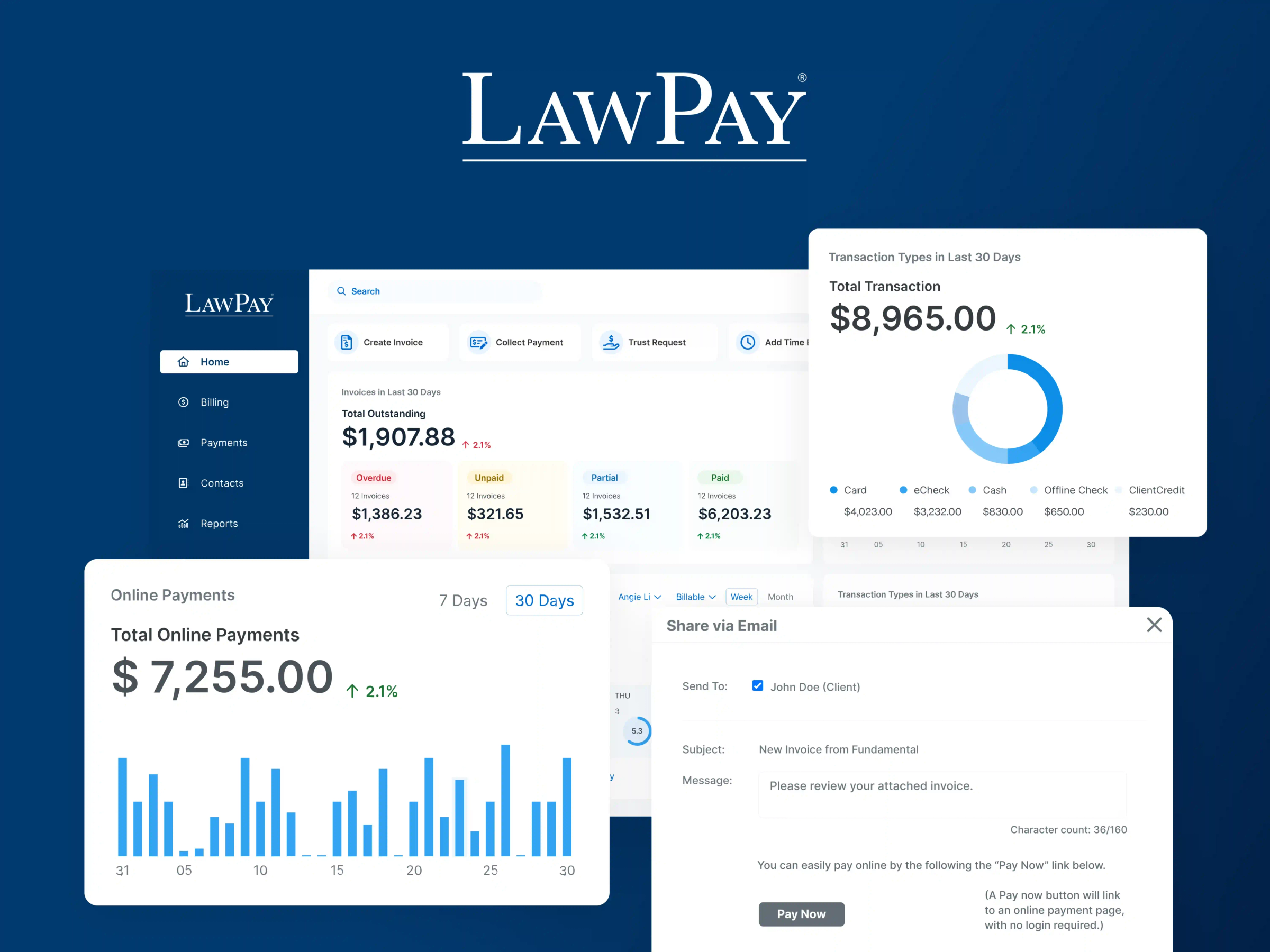Key takeaways
A lawyer payment plan is a fee agreement that allows clients to pay invoices incrementally. It provides clients with flexible billing terms and increased access to legal services. Law firms benefit from these structured payment schedules by creating predictable streams of income and improving collection rates.
Legal fees can be a major barrier for potential law firm clients. Limited budgets and the fear of high costs may be enough to discourage some from even asking for a consultation.
Setting affordable (and profitable) prices can help you appeal to as many clients as possible. However, some clients may also need flexible lawyer payment options.
Lawyer payment plans are an efficient and reliable method of growing your client base while creating a steady cash flow for your firm. They're also in demand, with 56% of law firms setting up payment plans based on our 2024 Legal Industry Report.
In this guide, we'll discuss what lawyer payment plans are, the steps to implement them, and how this financial arrangement benefits both parties.
What is a Lawyer Payment Plan?
Lawyer payment plans are financial agreements based on an outstanding balance clients pay over an extended period. These legally binding documents outline how much will be paid, when installments are due, and what happens when a payment is missed.
Law firms can choose to offer either a specific payment plan (for example, half now, half later) or tailor the plan to meet their client’s individual needs.
Payment Plans vs. Legal Fee Financing
Lawyer payment plans are fee arrangements law firms manage, while third-party lenders manage legal fee financing.
When implementing a payment plan, the client pays smaller, more manageable amounts toward their legal fees. Legal payment plans usually do not involve any outside financing, and the client is responsible for paying the entire amount—sometimes with interest.
Legal fee financing, on the other hand, involves borrowing money from a third-party lender to pay for lawyer fees. In this arrangement, the law firm receives the full amount owed from the third-party lender.The client then repays the legal loan in smaller increments to the third-party lender over time.
Overall, legal payment plans and legal fee financing have advantages and disadvantages. It’s important to understand the differences before choosing what to offer.
Payment Plan | Legal Fee Financing |
Clients work with the law firm to pay invoices over time | Clients work with a third-party financing company to pay invoices over time |
Law firms receive payment over time from the client | Law firm receives all of the payment upfront from the financing company |
Payment Plans
Attorney payment plans can be a win-win for lawyers and clients. A few key benefits your firm can expect to see when using traditional payment plans include:
Attracting more clients: Lawyers can make their services more accessible to clients who cannot afford to pay the full fee upfront.
Improving cash flow: Legal payment plans can provide a steady income stream that allows the firm to more accurately budget and plan for future expenses.
Building client loyalty: Lawyers can build trust and loyalty with their clients by offering flexible payment terms. Clients will likely appreciate a firm’s willingness to adjust, especially if competitors aren’t offering the same options.
Minimize the risk of collections: Offering smaller, more manageable billing increments helps clients stay on track and reduces the need for collection efforts.
While legal payment plans can offer benefits for lawyers, there are also some potential drawbacks to consider, including:
Risk of non-payment: Lawyers may be left with unpaid fees if clients can’t or refuse to keep up with the payment plan. This can be especially problematic if the lawyer has already provided the services.
Administrative burden: Managing payment plans may require extra non-billable work, such as sending multiple invoices, tracking payments, and following up on missed payments. Law firms may need to hire additional staff to manage multiple complex payment plans.
Increased financial risk: Lawyers must rely on unpaid funds when managing budgets and cash flow. If too many clients default on their payments, the firm may fall behind on bills, salaries, or other financial obligations.
Potential ethical concerns: Lawyers must ensure that their payment plans comply with all ethical rules and regulations, such as those related to fee splitting, confidentiality, and conflicts of interest. Failure to do so can result in disciplinary action or malpractice claims.
Legal Fee Financing
In comparison, legal fee financing can be a good option for lawyers who want to reduce financial risk, attract more clients, and streamline administrative tasks.
A few key benefits of legal fee financing include:
Guaranteed payment: The lawyer receives the full fee upfront from the financing company, with no risk of non-payment. This can help the lawyer manage cash flow and avoid financial risk.
Provide more payment options for clients: Clients can potentially have more flexible terms with a financing company compared to what law firms can reasonably offer.
Reduced administrative burden: Legal fee financing companies typically handle the clerical tasks associated with collecting payments.
Marketing benefits: Some legal fee financing companies offer marketing and promotional support—helping lawyers attract more clients and grow their business.
Legal fee funding can also include the following drawbacks:
Higher costs: Legal fee financing typically involves interest rates and fees that can make it more expensive than other payment options.
Limited options: Due to strict eligibility requirements, not all clients will qualify for legal fee financing. This ultimately protects the clients from overextending themselves financially but limits the lawyer's ability to offer financing as a payment option.
Compliance risks: Lawyers must ensure that the financing company they work with complies with all ethical and legal rules and regulations.
Should I Offer Payment Plans or Legal Fee Financing To My Clients?
The best payment arrangement for your law firm’s clients depends on their unique needs and preferences. The true client-centric solution is to offer both options so clients can choose what works best for them, so you can make services more accessible to a wider range of clients.
Why Should Lawyers Offer Payment Plans?
Law firms should offer payment plans since they can help them save time and improve cash flow while also improving client relations. Below are a few key reasons why this option can be beneficial.
Spend Less Time Chasing Payments
When time is money, chasing overdue payments can quickly become a costly expense that detracts from working on cases or expanding services. Payment plans allow you to schedule recurring payments at steady intervals. Revenue rolls in automatically, so you can focus on areas with greater impact.
Increase Collection Rate
Our 2024 Legal Industry Trends Report found that 48% of law firms collected more money while using payment plans. Law firms that offer installment plans make it easier for clients to cover legal expenses over time, effectively improving the firm’s cash flow and increasing the firm’s ability to get paid.
Make Your Services More Accessible
According to the Federal Reserve, 55% of payment plan (also known as “Buy Now, Pay Later”) users choose this financing option since it’s the only way they can afford a purchase.
By offering a payment plan option at your firm, you'll open your legal services to a wider client base while relieving the financial burden of a total upfront payment for lawyer fees.
Customer Satisfaction
Payment plans are an impactful way to empathize with your client’s needs. They provide flexibility to clients and their financial situations while nurturing a service-first focus that is prime for referrals. It can also help you stand out from competitors that don’t implement payment plans.
How To Offer Attorney Payment Plans at Your Firm
Offering attorney payment plans requires advanced planning to nail down the logistics of your plan model. This includes terms, payment methods, and what tools you’ll use to manage each plan. Review the steps below to learn how you can implement them at your law firm.
1. Develop a Payment Plan Model
Strategic preparation will help your firm assess what you can offer and how to effectively communicate with clients.
Initial questions might include:
What frequency and duration of payment plans can you offer?
What level of customization can you accommodate?
How do you plan to send timely invoices and payment reminders?
Will you charge a retainer fee?
Who keeps track of payments and client balances?
How will you handle disputes and payment errors?
Can you offer discounts or incentives to pay the full amount upfront?
Can you afford to offer legal fee financing?
Finding these answers will help you build a template that outlines the payment plan model and conditions that best serve your business.
2. Offer a Variety of Payment Types
Today's modern clients require more payment options than ever to finance their legal needs. Lawyers can offer several forms of payment, including:
Physical or virtual credit or debit cards
In-person tap-to-pay transactions
ACH transfers like eChecks
Legal fee financing through a third party
3. Use a Legal Payment Software
The best legal payment software systems make payment plans easy to execute by doing the heavy lifting, which lets you get back to your practice. Features should include automated invoice generation and delivery, payment tracking, and reports that help check balances and provide financial planning insight.
With LawPay, firms can easily set up payment plans over a period of time, such as monthly or quarterly, to help clients manage the cost of legal services. Lawyers can also customize payments to fit the client's budget and billing schedule.
With LawPay's legal fee financing solution, powered by Affirm, your clients can pay for legal services in installments while your firm receives 100 percent of the invoiced amount upfront. If a client misses a payment, your firm is never responsible for collecting or paying back the funds to the third-party lender.
LawPay’s other comprehensive billing features also give your law firm high-level insight into billing and invoicing. Quickly track payment activity, see the statuses of all accounts, and automate non-billable tasks like payment reminders to increase collection rate and decrease administrative work. Additional features like our secure Card Vault help further streamline the entire payment process.
4. Build a System for Missed Payments
Late payments are a reality that many law firms face, so it’s essential to know how to handle them before implementing a payment plan. Questions you’ll need to answer include:
Will you offer a grace period? If so, for how many days?
Will you accept partial payments?
Will you charge interest or late fees for missed payments? How much?
How will you communicate the next steps for missed payments?
How often will you send payment reminders?
When will your law firm stop services or take action due to missed payments? Will you plan to take legal action or work with a collection agency if payment is overdue for an extended period?
Communicating these answers to clients will set clear expectations that increase the likelihood of getting paid on time.
5. Create an Agreement
During the initial consultation with your client, transparency is key. Understanding their financial situation is important to determine their most appropriate payment plan. If they can only afford $200 monthly installments, anything more can lead to frustration and missed payments.
In addition to the amount, you’ll also want to discuss the following:
Payment due dates (bi-weekly, monthly, or quarterly)
Accepted methods of payment (debit or credit card, checks, and/or ACH transfers)
Late payment fees and terms (interest, penalties, and grace period)
How invoices will be sent (by mail or electronically)
Include any additional or customized billing terms in your written agreement. Then, once you and the client have agreed upon all conditions, you can request their signature on the attorney payment plan agreement.
If you decide to use legal fee financing through a third party, such as Affirm via LawPay, you won't need to worry about this step since the financing company will handle the agreement.
*Download our eBook, "The Billable Hour Reimagined," to learn how and why your law firm should tailor billing to your client’s needs.
Manage Your Law Firm's Payment Plans
Accurate and up-to-date account management ensures that payment plans run smoothly. Legal billing software can further streamline the process with live data and minimal effort.
With LawPay, you can accept online payments, monitor outstanding balances, and build custom reports to determine your cash flow from installment plans.
LawPay's custom financial reporting also makes it easy to understand where your firm stands at a glance. Whether you need a quick snapshot of year-to-date transactions or detailed reports of outstanding balances, LawPay’s reporting also allows you to curate data that can help determine if your current strategy is profitable.
Schedule a demo today to start earning more with payment plans and save time on account management. We'll help you set up automatic installment payments in seconds so you can get back to working billable hours and growing your business.
Schedule a demo to see what LawPay can offer your firm.
Get a demo
About the author

Gabriela JheanContent Writer
Gabriela Jhean is a Content Writer for leading legal software companies, including MyCase, Docketwise, CPACharge, CASEpeer, and LawPay—the #1 legal payment processor. She covers emerging legal technology, financial wellness for law firms, the latest industry trends, and more.
